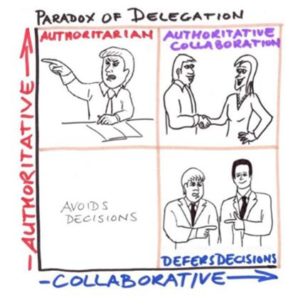
If your decisions are creating unintended consequences you may need to review how much you control the decision-making process. Are you the only one who really makes decisions or do you seek to collaborate?
Authoritarian Tendencies
We are currently witnessing an extraordinary change in international politics with some leaders making very wide-ranging decisions without appropriate collaboration, and it highlights an interesting paradox in the delegation of decision making. It still remains to be seen what the consequences of an authoritarian and provocative stance will be in the longer term. In cases where leaders are acting as if they have a 100% majority mandate with unilateral authority, and don’t show signs of willingness to collaborate and share some decisions with others, there is always a backlash with unintended consequences. No one wants an authoritarian, who makes all the decisions on their own. History is littered with examples of authoritarians who ended up with a lot of unintended consequences. They often came to an unpleasant end, leaving a trail of destruction behind them.
Deferring Decisions
Let’s look at an example of delegating decisions and not taking responsibility for making decisions. The European experiment of a union of sovereign states has lofty ideals that have successfully prevented war amongst the major European powers for a long period. However, the decision-making process in the EU, which emphasises collaboration and agreement, has created the unintended consequence of intolerable bureaucracy with a lack of clear leadership. This has led to cumbersome processes where decisions get bogged down in endless meetings and haggling about vested-interests and no-one takes responsibility because it is safer to defer decisions. Unfortunately, this is creating the unintended consequence of a backlash and increasing opposition to the whole idea of unity.
Wise Leadership and Authoritative Collaboration
This subject is explained in one of the paradox graphs designed by Dr Dan Harrison. Dan has made a unique contribution to the field of human development by using his expertise to highlight natural strengths and possible derailers. Wise leaders are aware of the delegation paradox and know how to balance the enjoyment of making decisions and taking responsibility with the enjoyment of collaborating with others when making decisions. They know that collaboration often leads to better decisions and has a number of advantages, like getting buy-in and making people feel part of the process. This participation can give valuable input while increasing the commitment to a decision and active participation in implementing it. Authoritative Collaboration is based on: “Never hesitate to take counsel from appropriate people, but always take full responsibility for your own decisions.” By exercising ‘Authoritative Collaboration’ wise leaders are willing to take responsibility for decisions and yet avoid the ego-trap of being authoritarian and insisting on having sole control of decisions. They also avoid deferring decisions to others because they worry about being blamed for a particular decision. An Authoritative Collaborator is a natural delegator because they will gently guide their team/organisation while maintaining responsibility. They create greater involvement from everyone and when a task or project is begun, people feel it is their own idea. When the task is complete, they feel it was their project. The opposite of Authoritative Collaboration is ‘Avoiding Decisions’ where someone avoids taking responsibility for decisions and doesn’t consult with others when making decisions.
The Paradox of Delegation
The Paradox of Delegation is explained below. There are two primary traits:
- ‘Authoritative’ which is the desire for decision-making authority and the willingness to accept decision-making responsibility.
- ‘Collaborative’ which is the tendency to collaborate with others when making decisions.

If we have a very high Authoritative tendency with low Collaborative tendencies we can end up being rather authoritarian and believe that collaboration is only for people who won’t take responsibility. On the other hand, if we have a very high collaborative tendency with low authoritative tendencies it can lead to Deferring Decisions to others and a belief that they will be blamed or even punished if things don’t work out. This tendency also demonises people who are authoritative. If we avoid decision-making authority, while at the same time avoiding making decisions jointly with others, there is a tendency to avoid decisions altogether. I’ve heard many leaders say that this particular tendency can be disastrous, especially in a rapidly changing and uncertain world. A typical entrepreneurial approach is that it’s better to make a poor decision than none at all.
Retaining your people
Numerous surveys are showing that the quality of leadership is becoming even more critical than ever before. In order to create a dynamic environment with highly engaged people who believe they are valued, you need to ensure that you are versatile and have strong Authoritative Collaboration so that people are fully involved while also having clear direction in your leadership. So where are you on this paradox? What are your decision-making preferences? What are the tendencies of your key people and are they being as effective as they need to be? How well are you and your team avoiding the unintended consequences of an unbalanced approach?
It is important to note that a strong trait is not necessarily a strength, because if a strong trait is unbalanced as described above it may produce unintended consequences. A genuine strength is created when two paradoxical traits combine to cancel out the unintended consequences and you are left with a balanced versatility which includes the complimentary benefits of each trait.
Adapted from an article by David Klaasen – To watch a presentation by David Click Here
If you are interested in exploring where you stand on this paradox and the 11 other paradoxes in this unique assessment just contact sales@resourcezone.com.au



Comment here